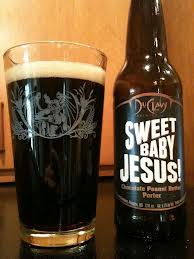My latest Vue Weekly column was written to fit into the magazine’s theme for that week (you can read it here). It was their Xmas feature and this year they went with a look at the religious aspects of the season. You can imagine the head-scratching that went on when my editor asked me to write something about beer, Xmas and religion.
To be honest, I wasn’t flummoxed for long. When you think religion and beer, what is the first thing that comes to mind? Well, the drunk monks, of course. I mean here the Cistercian monks that centuries ago figured out that brewing beer was a pretty good way to both serve god and sate thirst. Their descendents are the purveyors of the divine (in multiple senses of that word) Trappist ales. If you want to inject some piety into your holiday festivities, I can think of nothing better than a Westmalle Tripel or a Rochefort 10. If you want something really special – and can wait a while – age a bottle of Orval for two to three years. It develops a unique earthy, musty flavour that alters the profile of the beer completely.
In a way linking the brewing monks to Xmas imbibing seems quite appropriate. Whether Xmas really is Jesus’ birthday or not (and it more likely is not), in Western society it has become intrinsically linked to that event. Sipping on a Trappist beer is a way to acknowledge the modern interpretation of the season without having to either fully embrace its religious aspects or entirely reject it either. Consider Trappist Ales a good agnostic choice for the season.
Being every flexible, in the piece I also offer up a couple of more secular options, including St. Ambroise Oatmeal Stout and 5 A.M. Saint. The religious connection in both beer is solely the name – no religious icons were harmed in the making of these beer.
So, while I suspect wine, rather than beer, was the tipple of choice for the son of god, we at least have a few beer-y options that would meet his approval these days.



December 9, 2014 at 7:03 AM
A friend of mine brought over a bottle of St Bernardus Christmas Ale: definitely my favourite holiday beer.